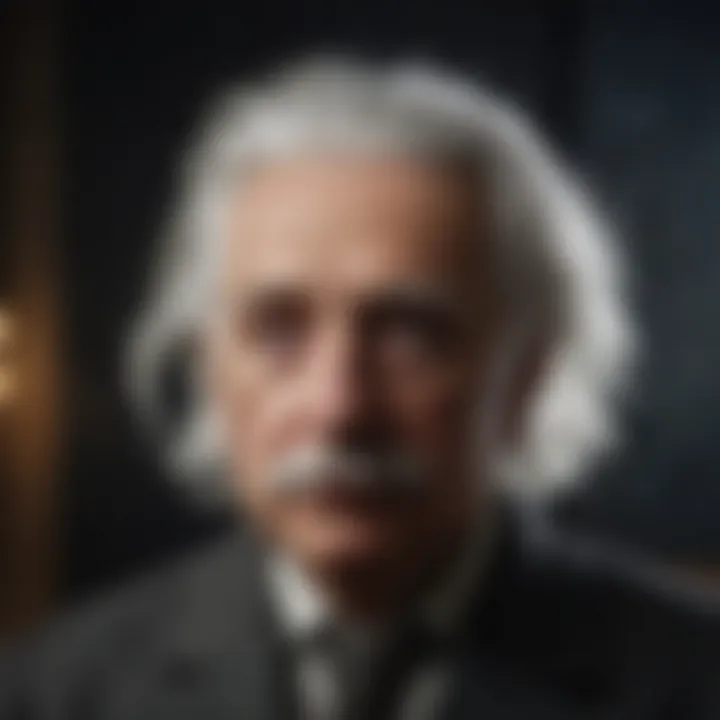Unveiling the Genius: An In-Depth Exploration of Einstein's Brilliance


Book Title and Author Introduction
Walter Isaacson's 'Einstein' delves into the life and mind of one of the most brilliant physicists in history, Albert Einstein. Isaacson, a renowned biographer known for his insightful works on iconic figures, meticulously explores Einstein's journey, from his groundbreaking theories to his personal struggles. The key themes in the book revolve around Einstein's revolutionary scientific contributions, his non-conformist nature, and his enduring legacy.
Summary of Book Content
The book 'Einstein' by Walter Isaacson offers a profound insight into the life and work of Albert Einstein. It covers key aspects of Einstein's theories, his struggles with societal norms, and his unwavering pursuit of knowledge. One of the highlighted passages encapsulating the essence of the book is when Isaacson writes, 'Einstein's genius lay in his ability to visualize and conceptualize complex scientific theories in simple, elegant terms.'
Three Lessons Learned
Lesson 1: The Power of Imagination
Isaacson emphasizes Einstein's reliance on imagination to formulate his groundbreaking theories. By thinking outside the box and embracing unconventional ideas, Einstein revolutionized the field of physics, showcasing the immense power of creative thinking.
Lesson 2: Persistence Amid Adversity
Through Einstein's challenges and setbacks, readers glean a vital lesson on perseverance. Despite facing numerous obstacles, Einstein remained steadfast in his pursuits, demonstrating the importance of resilience in achieving one's goals.
Lesson 3: Embracing Intellectual Curiosity
Einstein's insatiable curiosity and thirst for knowledge serve as a profound lesson on the value of continuous learning. By staying intellectually curious and open-minded, individuals can expand their horizons and make significant contributions to society.
Practical Applications
In real-life scenarios, the lessons from 'Einstein' can be applied by encouraging creative thinking in problem-solving, embracing challenges as opportunities for growth, and fostering a culture of lifelong learning. To implement these lessons effectively, individuals can engage in activities that stimulate imagination, persist in the face of challenges, and seek out new learning opportunities.
Introduction
The intricacies of Albert Einstein's life unfold in Walter Isaacson's book, echoing the genius of one of history's greatest minds. This section serves as a gateway to a captivating journey through Einstein's vast contributions and personal challenges.
Brief Overview of Einstein's Life
Early Years and Education
Albert Einstein's childhood and education form the bedrock of his future brilliance. Delving into his formative years unveils the genesis of his intellectual prowess and sets the stage for his groundbreaking discoveries. The unique blend of curiosity and non-conformity in his early life mirrors the unconventional path he would later carve, establishing a foundation of relentless inquiry that characterized his scientific endeavors.
Career Development


Einstein's career trajectory navigates through academia, research, and profound paradigm shifts in physics. His professional evolution from a patent clerk to a renowned physicist exemplifies a journey marked by resilience and unwavering dedication to unraveling the mysteries of the universe. The narrative illuminates the transition from obscurity to scientific prominence, highlighting the pivotal moments that propelled Einstein into the scientific pantheon.
Personal Challenges
Behind Einstein's intellectual brilliance lies a tapestry of personal challenges. From turbulent relationships to navigating societal expectations, his private life intersects with his public persona in a complex dance of triumphs and tribulations. Exploring these challenges provides a holistic view of the man behind the legend, unraveling the human complexities that shaped his towering intellect.
Importance of Walter Isaacson's Book
Uncovering Untold Stories
Walter Isaacson's book delves into the untold facets of Einstein's life, unearthing hidden narratives that enrich our understanding of the iconic figure. By shedding light on lesser-known aspects, the book presents a more nuanced portrait of Einstein, transcending the conventional depiction to reveal a multi-dimensional genius.
Analyzing Einstein's Impact
Isaacson's book offers a comprehensive analysis of Einstein's impact on science and society, dissecting the reverberations of his theories across different domains. By examining the ripple effect of Einstein's work, the book underscores the profound influence of his ideas on shaping modern intellectual discourse and scientific frameworks.
Relevance in Modern Context
Einstein's legacy continues to resonate in the contemporary landscape, providing a lens through which to interpret and address current scientific challenges. Isaacson's book bridges the past and present, illustrating the enduring relevance of Einstein's insights in navigating complexities of the modern world. It invites readers to reflect on the timeless wisdom embedded in Einstein's contributions and apply them to the evolving paradigms of today.
Exploring Einstein's Scientific Contributions
In this section, we delve into the crucial aspect of Einstein's scientific contributions, highlighting the pivotal role they play in understanding his immense impact. Einstein's scientific endeavors revolutionized the foundations of physics and continue to shape our perception of the universe. By exploring his work in this realm, we uncover a treasure trove of knowledge that transcends time and space.
The Theory of Relativity
General Theory
The General Theory of Relativity, a cornerstone of modern physics, elucidates the gravitational force as a curvature of spacetime caused by the presence of mass and energy. This theory fundamentally altered our understanding of gravity, proposing a new framework for interpreting celestial mechanics. The elegance of its mathematical formalism and the depth of its implications make it a quintessential subject of study, captivating researchers and enthusiasts alike.
Special Theory
Einstein's Special Theory of Relativity revolutionized our understanding of space and time, introducing the concept of spacetime as a unified entity. The theory's core tenets, including the constancy of the speed of light and the equivalence of mass and energy, have reshaped the foundation of modern physics. Its profound implications for particle physics and cosmology have solidified its prominence in scientific discourse.
E=mc² Equation
The iconic equation E=mc² encapsulates the essence of Einstein's theory, showcasing the transformative relationship between mass and energy. This simple yet profound formula unveils the interplay between matter and energy at the most fundamental level, laying the groundwork for breakthroughs in nuclear physics and quantum mechanics. Its ubiquitous presence in scientific discussions highlights its enduring relevance and significance.


Quantum Mechanics and Unified Field Theory
Foundations of Quantum Physics
Quantum mechanics, with its probabilistic nature and wave-particle duality, underpins the microscopic realm of particles and interactions. Einstein's contributions to quantum theory, though contentious at times, helped shape the foundational principles of modern physics. The exploration of quantum phenomena opens new vistas of understanding, challenging traditional paradigms with its counterintuitive concepts.
Challenges with Quantum Mechanics
The challenges within quantum mechanics, such as interpreting quantum entanglement and resolving inconsistencies with classical physics, continue to intrigue and confound researchers. Einstein's critiques of quantum theory, notably his rejection of its inherent randomness, reflect the enduring debates within the scientific community. Navigating these complexities illuminates the subtle nuances of the quantum world.
Quest for Unified Field Theory
Einstein's quest for a unified field theory, aiming to reconcile gravitation and electromagnetism, embodies the pursuit of a grand unifying framework for the fundamental forces of nature. Despite the elusive nature of this theoretical construct, the journey towards unification fuels interdisciplinary collaborations and theoretical advancements. The tantalizing prospect of unveiling a unified theory motivates scientists to push the boundaries of knowledge and explore the fabric of the universe.
Insights into Einstein's Personal Life
In this part of the article, we delve into the personal life of Einstein, offering a unique perspective into the man behind the genius. Understanding the personal aspects of Einstein's life is crucial in grasping the full scope of his character and motivations. By exploring his family dynamics, relationships, and personal struggles, readers can gain a more profound insight into the renowned physicist.
Family Dynamics and Relationships
Marriage and Divorce
Delving into Einstein's marital life provides a glimpse into his personal challenges and the impact of his relationships on his work. His turbulent marriages and divorces shed light on the complexities of his character and how they influenced his scientific endeavors. By examining this aspect, we uncover the intricacies of Einstein's emotional journey and how it intertwined with his intellectual pursuits.
Parenting Style
Evaluating Einstein's approach to parenting offers a unique perspective on his family dynamics. His unconventional parenting style and the balance between his scientific pursuits and family life reveal a different facet of this iconic figure. Understanding how Einstein navigated parenthood provides valuable insights into the man beyond his scientific achievements.
Friendships and Collaborations
Exploring Einstein's friendships and collaborations showcases the significance of interpersonal connections in his life. His relationships with fellow scholars and collaborators not only shaped his work but also influenced his personal growth. Analyzing these dynamics provides a comprehensive picture of Einstein's social interactions and how they impacted his worldview.
Political Activism and Social Stances
Unveiling Einstein's political activism and social stances offers a deeper understanding of his influence beyond the scientific realm. His advocacy for civil rights, pacifism, and involvement in world events highlighted his commitment to societal progress. By examining these aspects of his life, we uncover the intersection of science and social responsibility in Einstein's legacy.
Civil Rights Advocacy


Einstein's dedication to civil rights advocacy underscores his belief in equality and justice. Through his connections with prominent figures in the civil rights movement, he used his platform to fight against discrimination and promote inclusivity. Analyzing his contributions in this area showcases his multifaceted impact on society.
Pacifism and Peace Efforts
Einstein's pacifist principles and peace efforts demonstrate his steadfast commitment to global harmony. His opposition to war and advocacy for peaceful resolutions reflect his moral convictions and vision for a better world. By delving into this aspect, we unravel Einstein's enduring legacy as a proponent of peace.
Influence on World Events
Examining Einstein's influence on world events reveals his far-reaching impact on historical and political contexts. From his involvement in key global issues to his role in shaping diplomatic conversations, Einstein's influence transcended scientific boundaries. Understanding how his voice resonated in world events provides key insights into his role as a societal influencer.
Legacy of Einstein's Work
When delving into the legacy of Einstein's work, it becomes evident that his impact on modern science is immeasurable. The depth and breadth of his contributions have left an indelible mark on various realms of scientific inquiry. From revolutionizing our understanding of the universe to challenging existing paradigms, Einstein's work continues to inspire and shape the course of scientific discovery. His innovative theories and groundbreaking insights have laid the foundation for numerous advancements in physics and beyond. Exploring the legacy of Einstein's work offers a glimpse into the mind of a true visionary whose ideas continue to reverberate throughout the scientific community.
Impact on Modern Science
Influence on Physics and Astronomy
Einstein's influence on physics and astronomy is profound, with his theories fundamentally altering the way we perceive the fabric of the cosmos. By introducing concepts such as relativity and the equivalence of mass and energy, he revolutionized the field of physics, leading to paradigm shifts in our scientific understanding. The meticulous observations and rigorous mathematical frameworks he employed have set a standard for scientific inquiry that persists to this day. Einstein's contributions to physics and astronomy continue to shape our exploration of the universe, guiding researchers towards new discoveries and theoretical breakthroughs. His impact on these disciplines is not just significant but foundational, making his work essential to any in-depth study of modern science.
Technological Applications
The technological applications stemming from Einstein's work are vast and transformative, permeating various facets of modern life. Concepts like the photoelectric effect and the theory of relativity have paved the way for advancements in areas such as telecommunications, space exploration, and medical imaging. Einstein's theories have not only broadened our theoretical understanding of the physical world but have also catalyzed practical innovations that have revolutionized technological fields. By elucidating the fundamental principles governing the universe, Einstein's work continues to serve as a blueprint for technological progress, inspiring engineers and scientists to push the boundaries of what is possible.
Continued Relevance in Research
Despite being formulated decades ago, Einstein's work maintains a remarkable relevance in contemporary scientific research. The principles and insights he articulated remain vital to ongoing investigations in physics, astronomy, and related disciplines. Concepts like general relativity and E=mc² continue to occupy a central position in cutting-edge research, informing new experiments and theoretical frameworks. Einstein's work provides a robust foundation upon which modern scientific inquiries rest, serving as a touchstone for researchers seeking to unravel the mysteries of the universe. The continued relevance of his ideas underscores the enduring significance of Einstein's legacy and its perpetual value to the scientific community.
Conclusion
Reflections on Einstein's Enduring Legacy
Lessons for Future Generations
Discussing the pertinence of 'Lessons for Future Generations' within the context of Einstein's legacy unveils a crucial aspect of his enduring impact. Highlighting the key characteristic of extracting insights both scientific and philosophical from Einstein's life and work, we emphasize its role in fostering continuous learning and exploration for the intellectual growth of future generations. By delving into the distinctive features of these lessons, readers are exposed to a wealth of knowledge that transcends time, offering valuable perspectives on curiosity, perseverance, and the pursuit of knowledge.
Appreciation of Intellectual Pioneers
Exploring the significance of 'Appreciation of Intellectual Pioneers' in the narrative of Einstein's legacy sheds light on the interconnectedness of great minds throughout history. By emphasizing the key characteristic of recognizing and honoring the contributions of intellectual trailblazers, we underscore its role in cultivating a culture of respect and admiration for those who push the boundaries of human thought. Describing the unique feature of this appreciation fosters a sense of intellectual continuity and reinforces the legacy of visionaries who propel society forward through their innovative ideas and discoveries.
Call to Continuously Question and Explore
Examining the essence of 'Call to Continuously Question and Explore' underscores the fundamental ethos that guided Einstein's own inquiries and discoveries. Highlighting the key characteristic of promoting a spirit of curiosity and critical inquiry, we underscore its valuable contribution to nurturing a culture of intellectual exploration and innovation. Describing the unique feature of this call to question encourages readers to embrace a mindset of openness and skepticism, essential for fostering intellectual growth and challenging conventional wisdom in the pursuit of new knowledge and insights.







